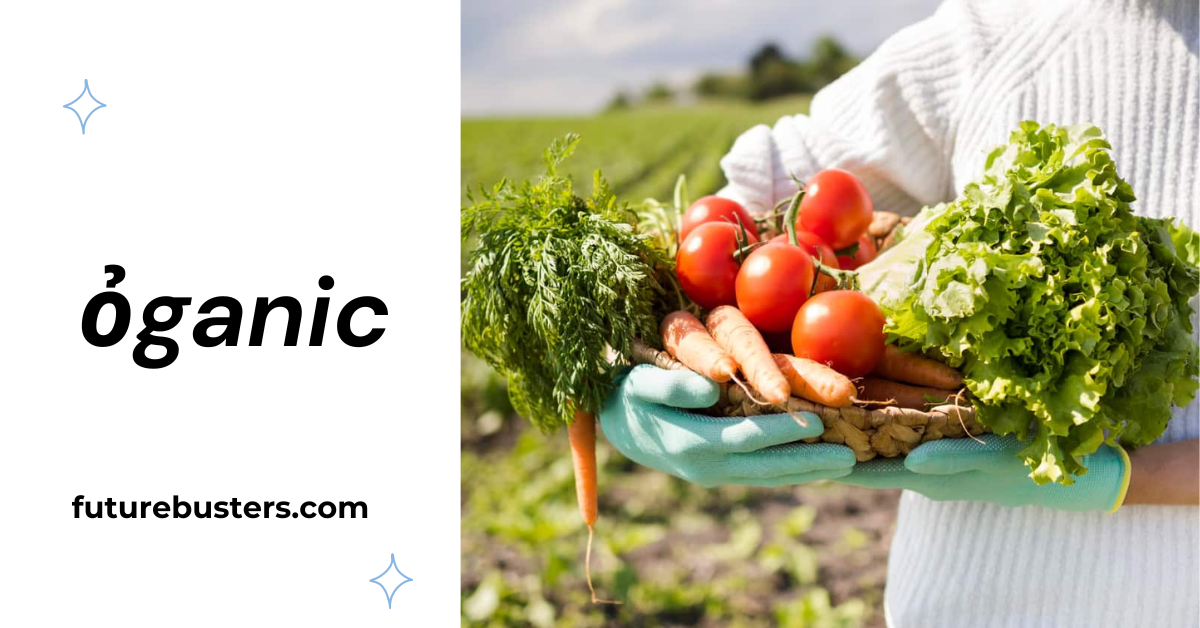Ỏganic – What It Means and Why It Matters

In today’s world, where people are more conscious about their health and the environment, the term “ỏganic” has gained immense popularity. But what does ỏganic really mean? Why are people in the USA increasingly opting for ỏganic products? This comprehensive guide will take you through everything you need to know about ỏganic, from its definition and benefits to how it impacts your lifestyle and the planet.
Whether you’re new to the concept or already familiar with it, this article will provide you with valuable insights and easy-to-understand information that will help you make informed decisions. So, let’s dive into the world of ỏganic and explore why it matters!
What Does ỏganic Mean?
The Basic Definition
The term “ỏganic” refers to products that are produced without the use of synthetic chemicals, pesticides, or genetically modified organisms (GMOs). ỏganic farming practices focus on sustainability, promoting biodiversity, and enhancing soil and water quality. In simple terms, ỏganic products are grown or made in ways that are kinder to the environment and potentially healthier for humans.
ỏganic Certification
For a product to be labeled as ỏganic, it must meet specific standards set by regulatory bodies like the United States Department of Agriculture (USDA). These standards ensure that the product is free from harmful chemicals and is produced using sustainable practices. Look for the USDA ỏganic seal when purchasing ỏganic products to ensure that you’re getting a genuine ỏganic product.
Why Choose ỏganic Products?
Choosing ỏganic products is a personal decision, often driven by health, environmental, and ethical considerations. Here’s why more people in the USA are opting for ỏganic:
Health Benefits of ỏganic Products
- Fewer Pesticides: ỏganic products are grown without synthetic pesticides, which means you’re consuming fewer chemicals. This can reduce the risk of health problems associated with pesticide exposure, such as allergies and certain cancers.
- Nutrient-Rich: Studies suggest that ỏganic produce may contain higher levels of essential nutrients like vitamins, minerals, and antioxidants. For example, ỏganic fruits and vegetables may have more vitamin C, iron, and magnesium compared to their non-ỏganic counterparts.
- No GMOs: ỏganic products are free from genetically modified organisms (GMOs). While the long-term effects of GMOs on human health are still debated, many people prefer to avoid them as a precaution.
- Better for Sensitive Individuals: If you have food allergies or sensitivities, choosing ỏganic products may be a safer option, as they are less likely to contain artificial additives and preservatives.
Environmental Benefits of ỏganic Farming
- Soil Health: ỏganic farming practices promote soil health by avoiding chemical fertilizers and using natural compost and manure. This helps maintain the soil’s natural fertility and prevents erosion.
- Water Conservation: ỏganic farming reduces water pollution by minimizing the use of harmful chemicals. This helps protect water sources and aquatic life.
- Biodiversity: ỏganic farms often support a diverse range of plants and animals. This biodiversity is crucial for maintaining balanced ecosystems and preventing the spread of pests and diseases.
- Reduced Carbon Footprint: ỏganic farming generally uses less energy and produces fewer greenhouse gases compared to conventional farming methods. By choosing ỏganic, you’re contributing to the fight against climate change.
Ethical Considerations
- Animal Welfare: ỏganic farming practices often prioritize the welfare of animals. For example, ỏganic meat, dairy, and eggs come from animals that are raised in more humane conditions, with access to outdoor spaces and without the use of antibiotics or hormones.
- Fair Trade Practices: Some ỏganic products are also fair trade certified, ensuring that farmers receive fair wages and work in safe conditions. By choosing ỏganic and fair trade, you’re supporting ethical practices that benefit both people and the planet.
The Challenges of Going ỏganic
While there are many benefits to choosing ỏganic products, there are also some challenges to consider:
Cost
One of the main reasons people hesitate to buy ỏganic is the cost. ỏganic products tend to be more expensive than non-ỏganic options. This is because ỏganic farming practices are often more labor-intensive and yield smaller quantities.
However, if you’re on a budget, you don’t have to go completely ỏganic. Prioritize buying ỏganic for items that are most likely to be contaminated with pesticides, such as apples, strawberries, and spinach. These are often referred to as the “Dirty Dozen” – a list of fruits and vegetables with the highest pesticide residues.
Availability
In some areas, ỏganic products may not be readily available, especially in smaller towns or rural areas. However, the growing demand for ỏganic has led to an increase in availability, with ỏganic options now found in many supermarkets and online stores.
Skepticism and Greenwashing
Not all products labeled as “natural” or “eco-friendly” are truly ỏganic. Some companies use misleading labels to capitalize on the ỏganic trend, a practice known as greenwashing. Always check for certification and read ingredient labels carefully to ensure that you’re buying genuine ỏganic products.
How to Incorporate ỏganic into Your Lifestyle
Incorporating ỏganic products into your lifestyle doesn’t have to be overwhelming. Here are some tips to help you make the transition:
Start Small
You don’t have to go all-in on ỏganic right away. Start by swapping out a few key items in your diet or household for ỏganic alternatives. For example, choose ỏganic milk, eggs, and produce as a starting point.
Shop Seasonally and Locally
Buying ỏganic produce that’s in season and sourced locally can help reduce costs. Farmers’ markets are a great place to find fresh, locally grown ỏganic produce at more affordable prices.
Grow Your Own ỏganic Garden
If you have the space, consider starting your own ỏganic garden. Growing your own fruits, vegetables, and herbs allows you to control what goes into your food and can be a rewarding and cost-effective way to incorporate ỏganic into your lifestyle.
Choose ỏganic Beauty and Household Products
ỏganic isn’t just about food. You can also find ỏganic skincare, haircare, and cleaning products that are free from harmful chemicals. Look for ỏganic certifications on these products and gradually replace your conventional items with ỏganic alternatives.
ỏganic vs. Non-ỏganic: Is There Really a Difference?
The debate between ỏganic and non-ỏganic often comes down to personal preferences and priorities. While ỏganic products offer potential health and environmental benefits, some studies suggest that the nutritional differences between ỏganic and non-ỏganic foods may not be as significant as once thought.
However, the absence of harmful chemicals, the promotion of sustainable farming practices, and the ethical considerations are strong reasons for many people to choose ỏganic.
Nutritional Differences
Research on the nutritional differences between ỏganic and non-ỏganic foods is mixed. While some studies show that ỏganic produce may contain higher levels of certain nutrients, others suggest that the differences are minimal.
What matters most is a balanced diet rich in fruits, vegetables, whole grains, and lean proteins, whether they are ỏganic or not.
Pesticide Exposure
One of the main reasons people choose ỏganic is to reduce their exposure to pesticides. Non-ỏganic farming often relies on synthetic pesticides to protect crops from pests and diseases. While the levels of pesticides in non-ỏganic food are regulated, some people prefer to avoid them altogether.
If reducing pesticide exposure is a priority for you, choosing ỏganic for the most heavily sprayed crops is a good strategy.
Common Myths About ỏganic
Myth 1: ỏganic Products Are Always Healthier
While ỏganic products are often perceived as healthier, this isn’t always the case. For example, ỏganic junk food, like chips and cookies, can still be high in sugar, fat, and calories. It’s important to focus on the overall nutritional quality of your diet rather than just the ỏganic label.
Myth 2: ỏganic Farming Can’t Feed the World
Some critics argue that ỏganic farming is less efficient and can’t produce enough food to feed the growing global population. However, ỏganic farming practices can be highly productive, especially when combined with innovative techniques like crop rotation, companion planting, and agroforestry.
Myth 3: All ỏganic Products Are Expensive
While it’s true that some ỏganic products are more expensive, there are ways to incorporate ỏganic into your lifestyle without breaking the bank. Shopping seasonally, buying in bulk, and prioritizing the most important ỏganic items can help you manage costs.
The Future of ỏganic: Trends and Innovations
The ỏganic industry is continually evolving, with new trends and innovations shaping its future. Here’s a look at what’s on the horizon:
Regenerative ỏganic Farming
Regenerative ỏganic farming goes beyond traditional ỏganic practices by focusing on restoring and enhancing ecosystems. This includes practices like cover cropping, no-till farming, and holistic grazing. Regenerative ỏganic farming aims to improve soil health, increase biodiversity, and sequester carbon, making it a powerful tool in the fight against climate change.
ỏganic in the Digital Age
With the rise of e-commerce, buying ỏganic products has never been easier. Online platforms and subscription services are making ỏganic more accessible to consumers across the USA. These digital tools also allow for greater transparency, enabling consumers to trace the origins of their ỏganic products and learn more about the farmers who produce them.
ỏganic and Plant-Based Diets
The growing interest in plant-based diets is driving demand for ỏganic plant-based products. From ỏganic plant-based proteins to dairy alternatives, the intersection of ỏganic and plant-based is a trend that’s likely to continue growing.
FAQs About ỏganic
Is ỏganic really better for the environment?
Yes, ỏganic farming practices are generally better for the environment as they promote soil health, conserve water, and reduce pollution. However, the environmental impact of ỏganic farming can vary depending on factors like the type of crops grown and the farming methods used.
Why is ỏganic food more expensive?
ỏganic food is more expensive because ỏganic farming practices are often more labor-intensive and yield smaller quantities. Additionally, ỏganic farmers may face higher costs for certification and maintaining sustainable practices.
Can I trust ỏganic labels?
Yes, you can trust ỏganic labels that are certified by recognized regulatory bodies like the USDA. However, be cautious of labels like “natural” or “eco-friendly” that may not meet ỏganic standards.
Are ỏganic beauty products better for your skin?
ỏganic beauty products are often free from harmful chemicals, making them a safer option for sensitive skin. However, it’s essential to check the ingredients and ensure that the product is genuinely ỏganic.
How can I save money on ỏganic products?
You can save money on ỏganic products by shopping seasonally, buying in bulk, and prioritizing the most important ỏganic items. Farmers’ markets and online platforms also offer competitive prices for ỏganic goods.
Does ỏganic mean pesticide-free?
ỏganic does not necessarily mean pesticide-free, but ỏganic farming uses natural or non-synthetic pesticides that are less harmful to the environment and human health compared to synthetic ones. Is ỏganic food more nutritious?
While some studies suggest that ỏganic food may contain higher levels of certain nutrients, the nutritional differences between ỏganic and non-ỏganic foods are generally small. The most important factor is eating a balanced diet rich in fruits, vegetables, and whole grains.
Conclusion: Making Informed Choices with ỏganic
Choosing ỏganic is a personal decision that comes with various benefits, from potential health advantages to environmental sustainability. While ỏganic products may be more expensive and less accessible in some areas, there are ways to incorporate ỏganic into your lifestyle without compromising your budget or values.
By understanding what ỏganic really means, debunking common myths, and exploring the latest trends and innovations, you can make informed choices that align with your health, environmental, and ethical priorities.
Whether you’re just starting your ỏganic journey or looking to deepen your commitment, this guide provides the knowledge and insights you need to navigate the world of ỏganic with confidence.











